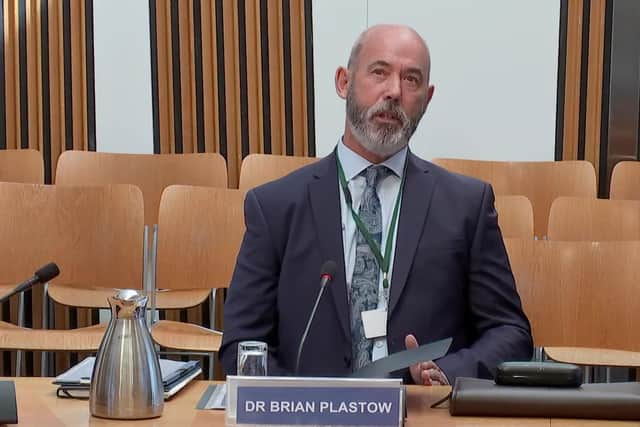Scotland could mark 'significant human rights achievement' if biometric data code of practice is introduced, says commissioner
Dr Brian Plastow, the first biometric data commissioner for Scotland and former police chief superintendent, brought forward a draft ‘code of practice’ on police-held biometric data to the Scottish Parliament on Wednesday.
If passed, Scotland would become the first country in the world to have such a code for criminal justice and policing purposes.
Advertisement
Hide AdAdvertisement
Hide AdThe code sets out 12 general ethical principles and the meaning of biometric data such as the use of facial recognition and finger prints to ensure compliance in the criminal justice system.


Principles include looking at areas such as privacy, data protection, and equality and human rights protection.
The code goes on to discuss a mechanism of a public complaint if non-compliance is demonstrated.
Biometrics are a way to measure a person’s physical, biological, physiological or behavioural characteristics to establish or verify their identity.
The role of the biometric data commissioner involves supporting and promoting the adoption of biometric data for lawful and ethical practices for policing and criminal justice purposes in Scotland.
Police Scotland use two types of retrospective facial recognition. The Police National Database – a UK-wide intelligence sharing system – has a retrospective facial search capacity to compare a ‘probe image’ to those previously in custody and a human being finally determines whether or not they are the same person. There is also a retrospective facial search within the Child Abuse Image Database.
Speaking at the criminal justice committee, Dr Plastow said: “When this is introduced, Scotland will become the first country in the world to have a statutory code of practice on the acquisition, retention, use and destruction of biometric data for criminal justice and policing purposes.
"That is actually a significant human rights achievement for Scotland and something we should be proud of. I also think it will further help to enhance the confidence in our already excellent criminal justice system in Scotland.
Advertisement
Hide AdAdvertisement
Hide Ad"This has been a well-considered piece of work that’s been developed by partners across the criminal justice community and I think it does strike the right balance between allowing the police the means of doing what they need to do to keep everybody safe, but at the same time protecting the human rights of individual members of public.”
The code has been through a three-month consultation period, involving 33 individuals, office holders and groups.
Dr Plastow said the code has the “unequivocal support” of those consulted.
He said: "In due course, once approved, we will produce a short user-friendly, public-facing version”.
If Police Scotland were to apply facial recognition technology to body-worn cameras, Dr Plastow said he would not be opposed to that as a concept.
However, he added, questions would remain around the legality and effectiveness of the technology.
Asked by Jamie Greene MSP whether he was concerned Police Scotland did not have a duty to involve him in discussions, Dr Plastow said no, but admitted there were “gaps”.
Dr Plastow said problems could arise if the UK Government decide to hand oversight of police-held biometrics to the Information Commissioner's Office as it would “leave a gap” in terms of who looks after national security determinations in Scotland.
Comments
Want to join the conversation? Please or to comment on this article.